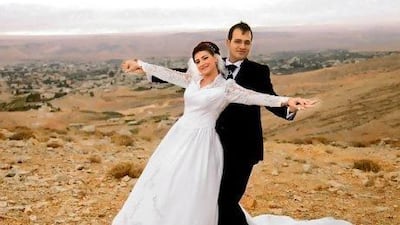BEIRUT // Kholoud Sukkarieh and Nidal Darwish hope their wedding marks not just a new life chapter - but also the beginning of a new Lebanon.
Late last year they became the first couple to wed in a civil ceremony in Lebanon, triggering a debate over the country's marriage laws, and by extension, the institutionalisation of its sectarian divisions.
Politicians including the country's president, Michel Suleiman, and former prime minister Saad Hariri have publicly supported civil marriage, while others remain vehemently opposed.
Mixed-faith couples from Lebanon, a melting pot of 18 religious sects, regularly travel 200 kilometres to tie the knot in Cyprus, the nearest place at which they can enter a civil partnership.
Both Muslims, there was no obstacle to Kholoud and Nidal marrying in Lebanon, but the couple wanted to make a stand against sectarianism, and began a convoluted 10-month process to exploit a legal loophole and get married in a civil ceremony at home.
"Lebanon is a country based on sectarianism, once civil marriage is legalised, this means that the first column of sectarianism is broken," says Kholoud, a 29-year-old English teacher.
The first step was to remove their sects - Sunni and Shiite - from their identity cards, an act that has been allowed since 2009. Once their religious status was removed from their cards, they could turn to a law dating from the French Mandate. Decree No 60 issued in 1936, declared that people who do not belong to any particular sect are entitled to a civil union.
After papers were obtained from their local mayor and a public notary, the couple were wed in an intimate ceremony in their home region of Bekaa in November. A sheikh was present to give a reading - the couple point out that their religious beliefs had no bearing on their desire for a civil union.
"It was just amazing, my wedding dress was wonderful, his wedding suit was … fine," Kholoud jokes. "All friends and family were there and we had very wonderful times. We didn't sit down for a single moment."
They kept their union secret for the next two months, waiting for approval for the marriage to be registered from the interior ministry. But when they still had not received it last month, Nidal and Kholoud went public, triggering a groundswell of support on social media - and most notably from the president. "Some politicians oppose civil marriage, but that will not change my beliefs or deter me from getting the train on the right track," Mr Suleiman said on Twitter.
Others have been less supportive. "Civil marriage is a sensitive issue that has sparked conflicting positions and we do not need a new contentious issue in Lebanon," the prime minister, Nijab Mikati, asserted during a recent cabinet session, saying he would not raise the issue with the council of ministers for as long as he is in power.
Then in late January, Lebanon's Grand Mufti joined the fray by issuing a fatwa against civil marriage, branding any Muslim politician that supports it an apostate.
Kholoud says the backlash was to be expected. "Civil marriage threatens the politicians, because once sectarianism is broken, this means we won't be following them blindly by our sects, we will be following our loyalty to the country," he says.
She and Nidal hope that more couples will take their example and marry in Lebanon, but holding them back is the lack of any legislation governing civil union. The interior minister, Marwan Charbel, has said he will not approve it without a law that sets out guidelines for issues that might arise, such as divorce.
A tangle of religious legislation governs family law in Lebanon - with each sect having their own laws and courts.
Chawkat Houalla, a lawyer specialising in family law, says that in Kholoud and Nidal's case, as both are Muslims, they would be subject to Sharia, as are all Muslims who travel outside the country to wed in civil ceremonies. If the couples are non-Muslim or mixed faith, the civil law from their country of union is applied.
If they were from different religions however, there would be absolutely no legal framework for their marriage, Mr Houalla says.
Attempts to legislate for civil marriage in the past have failed. A draft law on civil marriage was penned in the 1950s and during the tenure of the late president Elias Al Hrawi in 1998, but they were rejected by the country's religious authorities.
"Religious authorities have a monopoly on matters of marriage, divorce and family life and they don't want to see that change," says Mr Houalla. "It's difficult to see things changing in the near future."
But the grassroots campaign is growing. A Facebook group Tazawajna Madani ... w a'belkoun (We had a civil marriage ... may you as well), garnered nearly 25,000 members just days after launching. Set up by civil marriage campaigners, its members share photos of their civil ceremonies - largely in Cyprus.
Meanwhile, Kholoud and Nidal are settling into married life.
"We live in a flat in Dahieh and eat labneh everyday," laughs the bride. "Living the dream."
foreign.desk@thenational.ae

